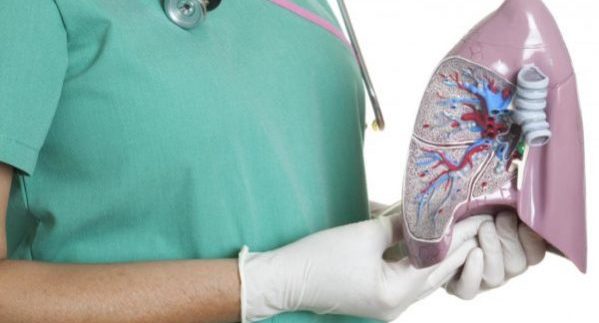There is hope for lung cancer sufferers worldwide.
A breakthrough research has found that the use of two existing drugs could successfully treat the disease.
The study delves deep into the molecular survival kit of lung tumours.
Many cancer deaths are driven by the KRAS oncogene.
KRAS is an essential gene, but in its mutant form, it is an important step in the generation of many types of cancer.
For over 30 years, the KRAS oncogene has been a focus of research.
Finding a way to remove its teeth would be pivotal in the treatment of a range of cancers.
As part of this effort, rather than targeting the gene directly, some scientists have focused on pathways that are related to the errant gene.
One pathway of interest centres on insulin and insulin-like growth factor-1 (IGF-1).
This pathway helps to regulate the uptake of nutrients into the cell, providing it with the energy and raw ingredients it needs to grow.
If the tumour cell’s fuel supply could be severed, its onward march might be halted.
However, it is not clear whether KRAS oncogenes are reliant on this particular pathway, and, in clinical trials, results have not been encouraging.
In fact, one study in mice found that lung tumours actually became more aggressive after the pathway was suppressed.
Undeterred, a team from the Boston Children’s Hospital in Massachusetts used a fresh approach.
In the mouse study mentioned above, the insulin/IGF-1 signalling pathway was only partially closed off.
In the latest study, though, a genetic technique was used that shut it down entirely.
To do this, the scientists crossed two strains of genetically modified mice.
The first is a well-used model for KRAS-driven lung cancer, and the other is a mouse used to study diabetes that lacks insulin/IGF-1 signalling.
In the diabetes mouse model, the insulin/IGF-1 pathway is unshackled by the deletion of two genes: Irs1 and Irs2.
These encode “adaptor” proteins, which are essential for the smooth running of the insulin/IGF-1 pathway.
“Our study uses a robust way to block insulin/IGF-1 signalling and addresses a long-standing question in KRAS-mutant lung cancer. When you use genetics, results can be more conclusive,” said senior study author Nada Kalaany, Ph.D, an assistant professor at Harvard Medical School, Boston, MA
Using their new model, the scientists demonstrated that by suppressing the two adaptor proteins, insulin/IGF-1 signalling is blocked and lung tumours are significantly suppressed:
“Almost all animals in this lung cancer model typically die within 15 weeks of KRAS activation,” says Kalaany. “But, the ones that lost both Irs1 and Irs2 were completely fine — we saw almost no tumours at 10 to 15 weeks.”
This finding is important because drugs that block insulin/IGF-1 signalling are already in use and freely available.
The results are published this week in the Proceedings of the National Academy of Sciences.
While the preliminary findings are hopeful, the researchers knew that there was more work to be done; cancer is a complex, ever-morphing disease with a terrifying knack for circumventing medical interventions.
To observe whether the cancer cells were able to navigate around this new roadblock, the team let the animals live longer to see what happened next.
As Kalaany explains, “Sure enough, at around 16 weeks, we started seeing some tumours. So, then we asked, how were these tumour cells able to overcome loss of Irs1 and Irs2?”
The answer was found in the levels of essential cellular building blocks: amino acids.
READ ALSO: NiMet predicts cloudy, dust haze weather on Saturday
Tumour cells lacking the adaptor proteins failed to move amino acids into their cells, despite a plentiful supply outside of the cell.
“Growth factors, like IGF-1, tell cells that nutrients are around,” says Kalaany, “so when you suppress their signalling, the tumour cells don’t take up the amino acids and think they are starved.”
“But we found that the tumour cells can compensate for this and break down their own proteins to generate amino acids.”
So, the KRAS-driven tumours threw out a curve ball: they had, once again, figured out a workaround.
By breaking themselves down — in a process known as autophagy — they can generate the raw material they need to thrive.
The researchers, however, were one step ahead.
Drugs that inhibit protein breakdown are already available.
These include chloroquine, which is currently involved in a number of cancer drug trials, and bortezomib, which blocks proteasomes (protein-digesting structures) and is already used to treat myeloma.
When the two prongs of the attack were combined, the results were more than encouraging.
They found that tumour cells lacking Irs1 and Irs2 did not grow well, and, when the inhibitors were added, growth stopped almost completely.
Additional studies will now be needed to understand how these two drug types might interact in a patient.
However, this is a considerable breakthrough, and the researchers are excited to take it to the next phase.
“Our work tries to identify metabolic dependencies and vulnerabilities in tumours,” says Kalaany. “If we identify collaborators, we would love to have a clinical trial in non-small-cell lung cancer combining IGF-1 inhibitors with autophagy inhibitors or proteasome inhibitors.”
By testing to breaking point every part of a tumour cell’s survival kit, researchers will, one day, beat cancer.
*Reported by Tim Newman for Medical News Today











